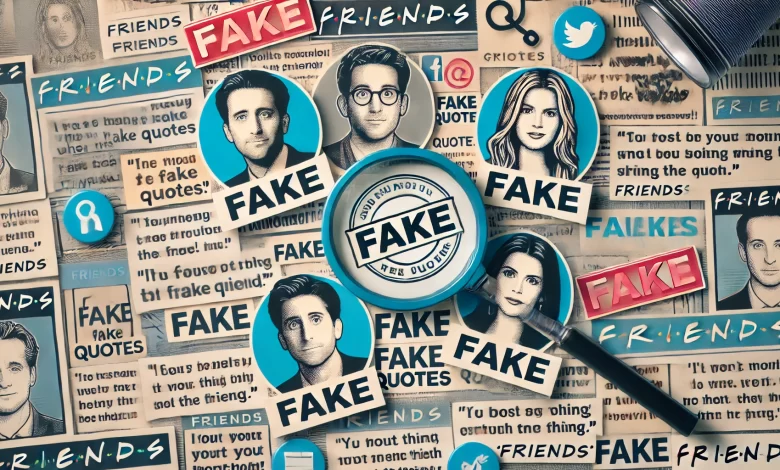Unmasking the Truth: Understanding Friends Fake Quotes

In the age of social media, where memes and quotes spread like wildfire, the phenomenon of friends fake quotes has become increasingly prevalent. These are fabricated sayings often attributed to famous personalities or characters that seem genuine at first glance. They can be humorous, misleading, or even harmful. This article delves into the world of friends fake quotes, exploring their origins, impacts, and ways to identify and counter them. By understanding these falsehoods, we can foster a more truthful and trustworthy online environment.
What Are Friends Fake Quotes?
Defining Friends Fake Quotes
Friends fake quotes are fabricated sayings or statements that are falsely attributed to celebrities, public figures, or fictional characters from popular media, like the TV show “Friends.” These quotes often seem believable because they reflect the personality or perceived opinions of the individual to whom they’re attributed.
Origins of Fake Quotes
The origins of fake quotes can be traced back to the early days of the internet when misattribution and false information began spreading through email chains and forums. Today, social media platforms amplify the reach of these quotes, making it easy for misinformation to go viral.
Popularity of Friends Quotes
The TV show “Friends” has a massive fan base, and its characters are well-known for their memorable lines and distinctive personalities. This popularity makes them prime targets for fake quotes, as people are more likely to believe and share sayings attributed to their favorite characters.
Impact on Public Perception
Fake quotes can significantly impact public perception by distorting the views and personalities of individuals or characters. This misinformation can lead to misunderstandings and spread false narratives, affecting the credibility of the quoted individuals and the integrity of the media they come from.
Identifying Friends Fake Quotes
Spotting the Signs of Fake Quotes
Learning to identify fake quotes is crucial in combating misinformation. Here are some key indicators to look out for:
Lack of Source Verification
One of the most common signs of a fake quote is the absence of a reliable source. Authentic quotes typically come with proper attribution, including the source and context in which the statement was made.
Too Good to Be True
If a quote sounds too perfect or aligns too neatly with current events or popular opinions, it might be fabricated. Real statements are often nuanced and context-dependent.
Inconsistent Style
Pay attention to the language and style of the quote. If it doesn’t match the known speech patterns or vocabulary of the attributed individual or character, it could be fake.
Fact-Checking Tools
Utilize fact-checking tools and websites to verify the authenticity of quotes. Websites like Snopes and FactCheck.org are valuable resources for debunking false information.
Community Vigilance
Encourage your social media community to be vigilant about the information they share. Raising awareness about the prevalence of fake quotes can help reduce their spread.
The Impact of Friends Fake Quotes
Social and Cultural Implications
Fake quotes can have far-reaching social and cultural implications, affecting both individuals and society at large.
Erosion of Trust
The spread of fake quotes contributes to the erosion of trust in media and public figures. When people repeatedly encounter false information, they become more skeptical and less likely to trust genuine sources.
Distortion of Character
Fake quotes can distort the personalities and values of individuals and characters, leading to misrepresentations that can tarnish reputations and alter public perception.
Reinforcement of Biases
Fake quotes often reinforce existing biases and prejudices. By confirming what people already believe, these quotes can deepen divides and entrench misconceptions.
Preventing the Spread of Friends Fake Quotes
Strategies for Combating Fake Quotes
Preventing the spread of fake quotes requires a multifaceted approach involving education, technology, and community efforts.
Promoting Media Literacy
Educating people about media literacy is essential in combating fake quotes. Teaching individuals to critically evaluate information and verify sources can reduce the spread of misinformation.
Leveraging Technology
Technology companies can play a significant role by developing algorithms and tools that detect and flag fake quotes. Social media platforms can implement stricter verification processes for quote-based content.
Community Engagement
Engaging communities in the fight against fake quotes is crucial. Encouraging users to report false information and participate in fact-checking initiatives can create a more informed and vigilant online environment.
Frequently Asked Questions About Friends Fake Quotes
How can I verify if a quote attributed to a ‘Friends’ character is genuine?
To verify if a quote attributed to a ‘Friends’ character is genuine, check reliable sources such as the script or official transcripts of the show. Websites like IMDb and fan databases can also provide accurate information.
Why do people create and share fake quotes?
People create and share fake quotes for various reasons, including humor, satire, to push an agenda, or simply due to misunderstanding. The viral nature of social media often amplifies these quotes’ reach.
What are some famous examples of friends fake quotes?
Some famous examples of friends fake quotes include exaggerated or fabricated lines attributed to popular characters like Joey Tribbiani, Chandler Bing, and Rachel Green. These quotes often reflect the characters’ personalities but were never actually said in the show.
How can social media platforms help reduce the spread of fake quotes?
Social media platforms can help reduce the spread of fake quotes by implementing stricter content verification processes, providing users with tools to report false information, and promoting media literacy initiatives.
What should I do if I encounter a fake quote on social media?
If you encounter a fake quote on social media, report it to the platform and inform the person who shared it about its inaccuracy. Provide them with reliable sources and encourage them to verify information before sharing.
Are there any tools available to help identify fake quotes?
Yes, there are several tools available to help identify fake quotes. Fact-checking websites like Snopes, FactCheck.org, and PolitiFact offer resources for verifying the authenticity of quotes and other information.
Conclusion
Friends fake quotes, while often entertaining, can have serious implications for public perception and trust in media. By learning to identify and counter these falsehoods, we can contribute to a more truthful and reliable online environment. Promoting media literacy, leveraging technology, and engaging communities are essential steps in combating the spread of fake quotes. Remember to always verify information, be vigilant about the content you share, and encourage others to do the same. By working together, we can reduce the impact of fake quotes and foster a culture of honesty and integrity online.






